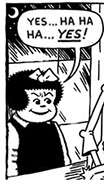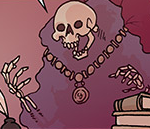hyphz posted:I don't mind that. What I mind is the implication that when the players meet a goblin, they have their PCs throw down their swords and fight it hand to hand with one hand tied behind their back because "we want the game to be a challenge so we'll make it one, and anyway if we failed it might be interesting". Players/characters would not be expected to do that in a PbtA because it wouldn't make sense/follow from the fiction. Instead, if that lone goblin was set up to be a challenge, the stakes are instead "does the goblin raise the alarm?" And that challenge would probably be a single roll instead of a combat encounter, even in Dungeon World.
|
|
|
|
|

|
| # ? May 24, 2024 22:55 |
|
hyphz posted:I don't mind that. What I mind is the implication that when the players meet a goblin, they have their PCs throw down their swords and fight it hand to hand with one hand tied behind their back because "we want the game to be a challenge so we'll make it one, and anyway if we failed it might be interesting". I got around this by explicitly playing storygames, because honestly to me the story is the most important part of why I play RPGs, and playing board games if I want an actual game-like challenge (which Gloomhaven was perfect for, because it is explicitly designed as a series of tactical combat scenarios with a simple story-driven unlock system attached to it).
|
|
|
|
What has to be understood is that in the games you are finding fault with, the challenge is not necessarily the point of the game, and players and game masters looking for it would be best suited to playing another game. It is not a fault of these games that they are like this, it is simply a matter of catering to a different taste in gaming. Don't play narrative games if you and your players don't like the trappings of narrative games.
|
|
|
|
hyphz posted:I don't mind that. What I mind is the implication that when the players meet a goblin, they have their PCs throw down their swords and fight it hand to hand with one hand tied behind their back because "we want the game to be a challenge so we'll make it one, and anyway if we failed it might be interesting". that's... not how this works at all. if the players meet a goblin, the goblin is a challenge (though it could be more or less of a challenge depending on their relative level of fictional strength). the players have a whole set of tools at their disposal to deal with the goblin, and if they fail/partially succeed, then yes that creates interesting complications. hyphz posted:It's the same as the Shadowrun guy that ended up with me saying "when you spent hours making your character shoot everyone, why complain that it worked?" Pretty much everyone I've asked for help on this from has said that was a wrong and ridiculous thing to say, but it just seems to be exactly what the rules of shared narrative games are encouraging. Hey, player, you want there to be a challenge and it could be interesting if you fail, so why not just lower those stats a few points? the mistake you made with the shadowrun player is that you weren't putting challenges in front of them that didn't play to their strengths. what they were asking for was variety, and you didn't provide that for them. you never challenged their weak spots or put them into positions where they would have to do something they were suboptimal at. you took away the wrong lesson hyphz posted:And I've met very few players who would find this fun. All the players I want to know want to at least feel that the challenge is being imposed on them, ideally by the environment of the game world rather than by the GM, but the latter could work as a push. If the player has to take action to create their own challenge, it bleeds through into the fiction and they feel that any challenge their PC did face was just the result of self-handicapping, and gives a very unsatisfying feel. I mean, maybe fans of these games don't think that way, but in that case I reserve the right to feel sad that there isn't a cool Dishonored meets The Dark Project game that will work for players without that mindset. you are still not understanding the game here. the gm is explicitly told to impose challenge on the players. you are told to not pull your punches because they have the tools to deal with the obstacles you put in front of them. you put those obstacles there because, as a fan, you want to see them overcome or deal with the setbacks/failures if they don't. you portray the world honestly by making those challenges consistent with the fiction of the world that you have established with the players. you're sad over something that isn't real. the game may not be what you want, but it does exactly what you ask of it
|
|
|
|
hyphz posted:I don't mind that. What I mind is the implication that when the players meet a goblin, they have their PCs throw down their swords and fight it hand to hand with one hand tied behind their back because "we want the game to be a challenge so we'll make it one, and anyway if we failed it might be interesting".
|
|
|
|
Tekopo posted:I think a misunderstanding is how many people treat RPGs as a game (and when I reference a game here I mean in the strictest possible way) which is what hyphz is doing, and how many people are treating RPGs as stories. I don't mean to bring this up in a "lol storygames aren't really games what idiots you are for playing them" btw and I really don't want the whole stupid "what is/isn't an RPG" argument to pop up. In my opinion, this is at the core of what is dysfunctional about D&D as a game. People are trying to use it to create stories that it is fundamentally incapable of supporting.
|
|
|
|
Tekopo posted:I think a misunderstanding is how many people treat RPGs as a game (and when I reference a game here I mean in the strictest possible way) which is what hyphz is doing, and how many people are treating RPGs as stories. I don't mean to bring this up in a "lol storygames aren't really games what idiots you are for playing them" btw and I really don't want the whole stupid "what is/isn't an RPG" argument to pop up. It's not so much that something like the PBtA system is "less game and more story" than it is that building the story is the game of it. The win condition isn't to crawl out of the dungen with all your limbs and a sack of gold, but that you made an entertaining story about how that happened. That's also why you can't do a premade module of the whole adventure. The appeal of the game is that both players and the GM drastically shape and redirect the story in play. If it was a campaign splat it'd get derailed in the first town.
|
|
|
|
Nuns with Guns posted:If it was a campaign splat it'd get derailed in the first town.
|
|
|
|
Nuns with Guns posted:It's not so much that something like the PBtA system is "less game and more story" than it is that building the story is the game of it. The win condition isn't to crawl out of the dungen with all your limbs and a sack of gold, but that you made an entertaining story about how that happened. This, however, is not my personal interpretation of what a "game" is, and my own definition is much broader and does include PbtAs/other storygames. I just used the strict interpretation as a short hand for "an activity that has a strict win/loss condition": sorry that I didn't make this explicit.
|
|
|
|
Yawgmoth posted:Have you ever been in a game of anything where this wasn't the case anyways? lol, no, but apparently hyphz has. Tekopo posted:Please note that in my wall of text, I was using a strict definition of what a "game" is as a mean to explain my argument, rather than making a value-judgement on PbtA. The strict interpretation of a "game" is that it is only a thing where people can explicitly win or lose in concrete terms (ie there is a defined win or loss trigger present within the game). I get what you're saying. The difference in a fail state of PbtA games is one of those would be a failure to create and entertaining story, which usually comes from compounding problems of inappropriate player/GM play and a weak adaption or understanding of Apocalypse World rules. In something like D&D it would be more like "my character/party wiped, time to reroll and try again." e-not that it's impossible for D&D games to fail for other reasons, but for the most part it's hard to fail in a PbtA game or Blades like that so long as you enjoyed the way that story played out. Nuns with Guns fucked around with this message at 18:28 on Jan 9, 2018 |
|
|
|
It's pretty easy to assume something with game on the name is a game.
|
|
|
|
Enders game is the worst I have ever played.
|
|
|
|

|
|
|
|
Nuns with Guns posted:lol, no, but apparently hyphz has.
|
|
|
|
Serf posted:the mistake you made with the shadowrun player is that you weren't putting challenges in front of them that didn't play to their strengths. what they were asking for was variety, and you didn't provide that for them. you never challenged their weak spots or put them into positions where they would have to do something they were suboptimal at. you took away the wrong lesson I did consider that. But the problem was that he was so heavily min-maxed for "shooting the other guy and not getting shot" that anything that didn't play into that strength was a certain failure before dice ever hit the table. Tekopo posted:4e actually pulled back the curtain on this facet of RPGs, which I do find hilarious. How did it do that? Tekopo posted:What some storygames attempt to do is create combat scenarios in games that don't explicitly have a loss condition, and I guess this is confusing to people that have been used to playing stuff like D&D, because before the only situation in which this occurred was social situations (you fail a social encounter and you get captured, a fight starts, you run away, people hate you etc etc etc). I think this is where the disconnect is: storygames treat every single situation experienced by the players like a D&D social encounter. I don't entirely see that myself. The flaw for D&D with social encounters is that it makes them either a single die roll or dependent on the player's skill rather than the PCs, but I've never seen one where the players were expected to be happy OOC about the encounter going badly IC.
|
|
|
|
hyphz posted:I did consider that. But the problem was that he was so heavily min-maxed for "shooting the other guy and not getting shot" that anything that didn't play into that strength was a certain failure before dice ever hit the table. if that's true, then that could in some ways be considered a failure of the system. but moreover, it doesn't mean you shouldn't have done it. the player literally told you they wanted other challenges and your response was "why did you make your character so good at the thing i keep making you do?" they wanted them to excel at something and get that used occasionally. not 24/7
|
|
|
|
hyphz posted:How did it do that? quote:I don't entirely see that myself. The flaw for D&D with social encounters is that it makes them either a single die roll or dependent on the player's skill rather than the PCs, but I've never seen one where the players were expected to be happy OOC about the encounter going badly IC. Also I'm not sure that me repeating the same things that have been said in this thread and you repeating the exact same arguments again is going to get anywhere.
|
|
|
|
hyphz posted:but I've never seen one where the players were expected to be happy OOC about the encounter going badly IC. Well, stories are often based around conflict. Failure can open up interesting and exciting possibilities and character arcs. My group has certainly had moments where we enjoyed everything going wrong, either as schadenfreude with these idiots failing their way forward, or as a vehicle for drama and conflict with NPCs. Permanent consequences can be attached to failure that don't result in death (e.g. they lose support of an important NPC, they permanently get a wound or scar, they need to go ona sidequest to find a cure, etc.) and these can be more interesting than everything doing perfectly fine? And that's... fun? Deltasquid fucked around with this message at 21:01 on Jan 9, 2018 |
|
|
|
Tekopo posted:It's not about being happy, but that's the entire point of roleplaying games, even in D&D. This is the disconnect that I'm talking about, actually. The social parts of D&D and PF try to act like they are a game, but mechanically they are not, because the direst consequences for failing a roll is that the players actually get to play the game properly by entering a fighting segment (which, to some players, would actually be a reward rather than a penalty). That's exactly the problem that D&D and PF have. I absolutely agree about that, in fact I wondered if a "penal combat" system should be added to these games to prevent that. But I don't see the assertion behind the fact that stories cannot be told under a system where the PCs and players are not expected to do the best they can to succeed, even where failure would be more narratively interesting - because that quickly becomes a can of worms in that it has to be the right kind of failure that doesn't end the story, and it has to be at the right frequency or you Worf Effect the PC, and it has to be insulated so the other players don't get penalized for what someone else did, and by the time it's all allowed for there's probably pretty much no options left. (Worf Effecting the shooter guy was one of the problems I had with trying to work around him in Shadowrun.) If you're reading a book and a character acts in a way that goes against the character's desires and makes it obvious that the author has just written them doing that so that the story proceeds in an interesting way, then that's a bad book, but not every book is like that. And if you can write a book without it the author never having to openly do that, surely you can tell a story without a player ever having to do that, too?
|
|
|
|
hyphz posted:I absolutely agree about that, in fact I wondered if a "penal combat" system should be added to these games to prevent that. i just wanna highlight this bit because it drives me bonkers. i have pointed out multiple times how, in blades in the dark, characters are expected to to their best to succeed. this is done before the roll, when you ask for devil's bargains, push yourself, get help from another pc or benefit from a set up action. you're always trying to roll that 6, but the deck is stacked against you. so then the game gives you resistance rolls, armor, etc to deal with failures/partial successes. and only after that are you even remotely facing down failure. the game does what you want it to do, but this fact continues to elude you
|
|
|
|
You keep revisiting the idea that for some reason players consenting to complications or adversity where it makes fictional sense is not playing "optimally" as through players and PCs are some objective truthbots that must break a game over their knees. Even though multiple people have told you this isn't how it works. In fact, it's the exact same broken logic Frank Trollman applied to FATE, so those comparisons earlier are disturbingly apt. Worse, this is the exact stupid argument James Desborough was making when he was wondering why PCs in Apocalypse World aren't a constant orgy ball rolling across the wastelands to optimize xp gain. I hope you're happy with this knowledge. Nuns with Guns fucked around with this message at 21:12 on Jan 9, 2018 |
|
|
|
The concept of 'follow the fiction' makes me think of a (probably apocryphal) anecdote about Raymond Chandler's novel-writing advice. Whenever he'd find that he'd written himself in a corner, and couldn't think of an obvious next step for the plot to take, he would just have some nameless goon take potshots at the protagonist through a window or something, and then have the ensuing chase stumble back onto the plot. This goon was never foreshadowed in the story. He wasn't planned out. Chandler never even considered his existence before asspulling him into existence. But this goon is still following the fiction, because in the context of a pulp noir kind of story, yeah, it's totally buyable. THAT is what following the fiction means. It doesn't mean following a preplanned script, it means understanding the flow of the story, and picking something that keeps the flow going.
|
|
|
|
hyphz posted:I absolutely agree about that, in fact I wondered if a "penal combat" system should be added to these games to prevent that. how much time do you spend on TVTropes in a single day, would you say
|
|
|
|
hyphz posted:I don't see the assertion behind the fact that stories cannot be told under a system where the PCs and players are not expected to do the best they can to succeed, even where failure would be more narratively interesting In games like BitD, the characters are absolutely expected to do their best to succeed. It's not that failure is necessarily more interesting than success, or that success is more interesting than failure. It's that failure or success, for purposes of narrative, are equally compelling parts of a story. It's not necessarily something you're aiming for as a player or a GM. Having a character go through ups and downs is interesting. Having a character struggle and fail over and over and finally succeed is compelling. Having a triumphant and successful character brought low is compelling. Neither the GM nor the players have to try to build these narratives intentionally as they're playing BitD or it's ilk. The players just playing the game and doing their best to succeed is enough to produce these narratives.
|
|
|
|
hyphz posted:I absolutely agree about that, in fact I wondered if a "penal combat" system should be added to these games to prevent that. This also brings up the reverse problem. Let's say that you have crafted a character that, in a specific situation, would do an action that would actually be detrimental to the party/other characters etc. How do you fit that the framework without it potentially destroying the game? What if his action, which is completely in character and therefore conforms to the expectations of the game, leads to a TPK? Then ideally you would want to make sure that this character is prevented in doing that in order to prevent the TPK from occurring, because the roleplaying of one person shouldn't impact the enjoyment/expectations of others. But in the end you are still restricting the roleplaying of someone in order to prevent a bigger issues, and thus you are forcing a player to not play in character in order to conform to the desires of the other players. PbtAs and other storygames don't have this problem, in general. If the storygame is structured correctly and has made allowances for the above character, it can be fit into the story without negatively affecting other players.
|
|
|
|
Nuns with Guns posted:You keep revisiting the idea that for some reason players consenting to complications or adversity where it makes fictional sense is not playing "optimally" as through players and PCs are some objective truthbots that must break a game over their knees. Even though multiple people have told you this isn't how it works. In fact, it's the exact same broken logic Frank Trollman applied to FATE, so those comparisons earlier are disturbingly apt. Worse, this is the exact stupid argument James Desborough was making when he was wondering why PCs in Apocalypse World aren't a constant orgy ball rolling across the wastelands to optimize xp gain. I hope you're happy with this knowledge. I heard that one written in the other direction about Monsterhearts - where in that game if a human has sex with a supernatural, they trigger their “dark self”. So naturally a player asked, “wouldn’t we just not do that then?” I can sort of see the desire to do that for fiction in an agreed romantic style. But it seems here what I’m being told is that the PCs have to spend resources trying to pick the lock and at the same time be cool with knowing that the GM could just spawn another locked door between them and their goal, 10 more, 100 more, because hey it’s not that bad if they don’t manage to pick one. That just seems a sideways argument. And none of the rules mentioned deny that. The GM is a fan of the players and wants to see them overcoming obstacles, well hey there’s loads of obstacles to overcome in the form of doors. If he keeps throwing doors at them until they fail and get caught, well, that’s ok because he wants to see how cool it is when they break out of jail. And the GM could play off the PCs expectations in a normal environment, but this is not a normal environment, it’s explicitly meant to be bizarre, it’s a scary haunted house run by witches, who’s to say they can’t make a reality pocket of infinite locked doors if they want? Sounds like an excellent way to trap thieves. It’s a player agency issue. What people are saying seems to me to come down to “not having agency is cool because the story can still be good”. But what if they want agency for agency’s sake? Oh, and I have nothing against these games. I just want to know how to be one of the cool kids they’re playable for!
|
|
|
|
hyphz posted:I can sort of see the desire to do that for fiction in an agreed romantic style. But it seems here what I’m being told is that the PCs have to spend resources trying to pick the lock and at the same time be cool with knowing that the GM could just spawn another locked door between them and their goal, 10 more, 100 more, because hey it’s not that bad if they don’t manage to pick one. That just seems a sideways argument. there's nothing stopping the gm of a d&d game from putting a million locked doors between the players and their goal either. but bitd actually has rules that say, "you shouldn't do this" quote:If they get into position, make the roll, and have their effect, they get what they also, this is sort of an unspoken rule of gming called "don't be a loving rear end in a top hat" hyphz posted:And none of the rules mentioned deny that. The GM is a fan of the players and wants to see them overcoming obstacles, well hey there’s loads of obstacles to overcome in the form of doors. If he keeps throwing doors at them until they fail and get caught, well, that’s ok because he wants to see how cool it is when they break out of jail. And the GM could play off the PCs expectations in a normal environment, but this is not a normal environment, it’s explicitly meant to be bizarre, it’s a scary haunted house run by witches, who’s to say they can’t make a reality pocket of infinite locked doors if they want? Sounds like an excellent way to trap thieves. does anything in the established fiction of blades in the dark's duskwall lead you to believe that such a trap would be possible? if so, what is it? but hey, gently caress all that, that actually sounds like a really cool obstacle for the whisper to contend with getting the party out of! you could totally use "infinite hallway of locked doors" in a game, but going by the principle of "don't hold back on what they earn" it isn't the weird bad thing you say it is, but actually pretty neat
|
|
|
|
Serf posted:there's nothing stopping the gm of a d&d game from putting a million locked doors between the players and their goal either. but bitd actually has rules that say, "you shouldn't do this" But what “have they earned?” If they have earned access through that one door, that says nothing about not being another one. If they have earned success, then every heist is one roll. If they have earned some percentage of success, then what percentage? When we’re judging effect, what measure is it by? Can it have great effect at opening the door but limited effect at getting to the loot at once?
|
|
|
|
dude you just do it. like there isn't anything complicated, you just play it out. you're overthinking this. you just tell a cool story with the help of your gamer friends. you just categorise what happened with the rules and your buds, fidget with the numbers and clocks, and then just come up with another cool thing that fits. that leads to a climax, heist ends and you get a little tangled in the post-mission sheet. There isn't some secret mystery or anything, you just try to have cool stuff happen.
|
|
|
|
hyphz posted:But what “have they earned?” If they have earned access through that one door, that says nothing about not being another one. If they have earned success, then every heist is one roll. If they have earned some percentage of success, then what percentage? When we’re judging effect, what measure is it by? Can it have great effect at opening the door but limited effect at getting to the loot at once? When you're running the game, you know what's appropriate to do when. Follow your instincts. Does it feel like they've been doing the heist well enough and have overcome enough obstacles to have success passed their way, based on the setup and the tier? Then do it, give them whatever success feels right. It's going to vary from table to table, GM to GM, group to group. There is no way to point at something to prove it was the appropriate time to do it. It just feels like the right time. For some groups, that means heists will be harder than others, because the GM will feel like things are going better/worse even if they're going the same. Just follow your heart. Even if it doesn't seem like it's going to be a good experience, give it an honest try, and I think you'll find it'll work better in practice than it seems like it will on paper for you right now.
|
|
|
|
hyphz posted:But what “have they earned?” If they have earned access through that one door, that says nothing about not being another one. If they have earned success, then every heist is one roll. If they have earned some percentage of success, then what percentage? When we’re judging effect, what measure is it by? Can it have great effect at opening the door but limited effect at getting to the loot at once? it all depends on their fictional positioning. if they overcome a locked door, then that should be rewarded with passage through. this can be as broad or as limited as you like, but generally speaking if you keep making them roll to unlock doors that's not fun or interesting for anyone involved. maybe as part of their fictional positioning you tell the pc that you can make their action desperate by allowing them to take a long time, but the resulting great effect lets them bypass all the normal doors from now on with no need to roll. now neither party has to worry about rolling for the apparently infinite doors you want to put between the players and their goal just because you can. if you broadened the scope of the score, then that makes things even easier. standard effect is 2 ticks on a 4-segment clock that i would label "getting through the mansion" with an associated danger clock called "alert" that gets ticked as a complication for failures/partial successes. maybe sneaking past the guards is another challenge, or dispelling magical wards, or charting their way through the weird shifting hallways. it doesn't matter, once the challenges are overcome, then they're done with that clock, and they've probably either got the attention of the occupants or they have burned some resources (this is barring extraordinary luck of course). but that one clock isn't the only obstacle. if you're here to steal some sort of magical doodad, then that will probably have its own security clock, probably even a 6-segment clock for that which they have to get through, still ticking down that danger clock. and really what's cool about blades is that this is all optional. it is a scaffolding you can use to plan these things out or you can just wing it and follow the fiction wherever it takes you. i just finished back-to-back campaigns of strike that lasted me 2 years and i basically planned nothing and made it all up on the fly. it was super-easy actually, you just have to let go of being so rigid and defined
|
|
|
|
hyphz posted:I heard that one written in the other direction about Monsterhearts - where in that game if a human has sex with a supernatural, they trigger their “dark self”. So naturally a player asked, “wouldn’t we just not do that then?” Read and play the games and see how they go at the table, instead of reading frank trollman hit pieces on the games that pull out one element and go 'this doesn't make sense in D&D, therefore it doesn't make sense here' Like seriously Monsterhearts is a game with a premise that it's about messy teenage relationships and their implications, and it has mechanical support for emotional ties in the form of strings. You can play the game and decide well poo poo I'm never going to interact with anyone else because they might get a string on me and that might mechanically hurt my character - but at that point why are you bothering? The whole reason you're playing the game is to have interesting things happen to your character, and triggering your darkest self is SUPER INTERESTING.
|
|
|
|
Almost every objection hyphz has raised applies just as equally to any form of RPG EXCEPT running an extremely procedurally tight system in a set module with no player deviation from the railroad. At this point they seem to be objecting to the concept of free will.
|
|
|
|
Having actually played a ton of PbtAs, I find arguments that they lack player agency super-weird because it's exactly the opposite of what they do. Some people even complain that they allow the players too much agency, in the form of allowing them to shape what the world is and what NPCs do. It's coming down to "you keep using that word. I don't think it means what you think it means"
|
|
|
|
Out of a fear of arbitrarily locked doors and the desire to minimize danger and maximize profits, I have decided to stay home from this whole dungeon thing and start a small business. Here is a list of sensible and safe investments I am making with my starting gold, and here is a wishlist of magical items I'm interested in buying when my midlife crisis hits. What do I roll to file for an EIN?
|
|
|
|
So, on the subject of literally fuckin' anything else how's everyone's week shaping up? I'm back at work tomorrow oh no
|
|
|
|
Canine Conspiracy posted:Out of a fear of arbitrarily locked doors and the desire to minimize danger and maximize profits, I have decided to stay home from this whole dungeon thing and start a small business. Here is a list of sensible and safe investments I am making with my starting gold, and here is a wishlist of magical items I'm interested in buying when my midlife crisis hits. What do I roll to file for an EIN?
|
|
|
|
hyphz posted:But it seems here what I’m being told is that the PCs have to spend resources trying to pick the lock and at the same time be cool with knowing that the GM could just spawn another locked door between them and their goal, 10 more, 100 more, because hey it’s not that bad if they don’t manage to pick one. That just seems a sideways argument. Please show me in the rules where D&D stops me doing this as a GM. Hell, show me in the rules where any traditional RPG stops me doing this.
|
|
|
|
Sion posted:So, on the subject of literally fuckin' anything else how's everyone's week shaping up? I'm back at work tomorrow oh no There were some miscommunications in my game Monday that led to everyone kind of being down on it and I went back in to my volunteer gig today only to find that woops, all our systems were down. Great start to the week!
|
|
|
|

|
| # ? May 24, 2024 22:55 |
|
thefakenews posted:Please show me in the rules where D&D stops me doing this as a GM. Hell, show me in the rules where any traditional RPG stops me doing this. As you can see on the map of the dungeon in this module there aren’t an infinite number of doors. Except for in the hallway of infinite doors.
|
|
|






























